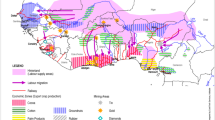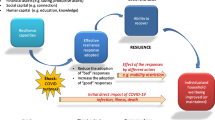Abstract
A contested issue in the international debate on food security is the role of trade in safeguarding food security at the global and national level. This paper explores how the issue of food security and trade has been discursively framed in two international organizations, the Food and Agriculture Organization (FAO) and the General Agreement on Trade and Tariffs World Trade Organization (GATT/WTO), from 1945 to 2014. We argue that there are identifiable shifts in FAO’s positions on food security and trade in the 1980s and 1990s towards trade liberalization as advocated by the WTO. The official view of the WTO secretariat and many of its member states (proponents of trade liberalization in agriculture) is that trade liberalization is both necessary and conducive for food security. The FAO has adopted this discourse. Although this is the dominant discursive framing, counter-framings of the food security - trade problem has played an important role in the deadlock of the Doha Round negotiations. We consider how this may influence the global food trading regime.
Similar content being viewed by others
Notes
The World Bank and the OECD have also engaged in the debate but these mainly play an epistemic role while the FAO and the WTO have policy roles. The impact of the World Bank and OECD on discursive framings, however, should not be underestimated.
There are two main reasons for why this was not an FAO conference. The US Secretary of State Henry Kissinger initiated the conference but decided to bypass FAO, first for domestic reasons (a UN meeting would be State Department territory), and second, because of foreign policy (the Soviet Union was not a member of FAO) (Shaw 2007: 121–122).
Originally a temporary arrangement pending the establishment of the International Trade Organization (ITO), but this new organization never materialized due to opposition from the US Senate (Toye 2012: 95–98).
The meeting was initiated in 1994 by Jacques Diouf, the new director-general for FAO.
Contrary to the requirements of the GATT Article VI regulating anti-dumping measures.
http://www.wto.org/english/news_e/news13_e/mc9sum_07dec13_e.htm: Accessed 16.12.13
In a ‘Information note’, September 2013, commenting on an informal G-33 proposal, FAO and ICTSD (International Centre for Trade and Sustainable Development) expressed doubts that building public stocks through price support for smallholders would actually contribute to food security. Instead, it is argued that sourcing food from the world market would be a more efficient way of addressing food security (FAO/ICTSD 2013). This position can be as a reflection of the discursive framing of food security and trade previously adopted by the FAO.
The G-10 members are China Taipei, Rep. Korea, Iceland, Israel, Japan, Liechtenstein, Mauritius, Norway, Switzerland.
Not only is this discourse dominant in the WTO and the FAO, but also in the other leading global epistemic organizations, mainly the OECD and the World Bank.
References
Bernal, L. E. (2004). South-South Cooperation in the Multilateral Trading System: Cancun and Beyond, South Centre: Working Papers. Trade-Related Agenda, Development, and Equity (T.R.A.D.E.).
Brooks, J. (2014). Policy coherence and food security: the effects of OECD countries’ agricultural policies. Food Policy, 44(1), 88–94.
Candel, J. (2014). Food security governance: a systematic literature review. Food Security, 6(4), 585–601.
Candel, J., Breeman, G. E., Stiller, S. J., & Termeer, C. J. A. M. (2014). Disentangling the consensus frame for food security: the case of the EU Common Agricultural Policy reform debate. Food Policy, 44(1), 47–58.
Daugbjerg, C., & Swinbank, A. (2009). Ideas, institution and trade. Oxford: Oxford University Press.
Dryzek, J. (1997). The politics of the earth: Environmental discourses. Oxford: Oxford University Press.
FAO (1996). Rome Declaration on World Food Security. 13–17 November, Rome.
FAO (2002). Declaration of the World Food Summit: Five Years Later. 10–13 June, Rome.
FAO. (2003). Trade reforms and food security: Conceptualizing the linkages. Rome: FAO.
FAO. (2008). The State of food and agriculture: Biofuels: prospects, risk and opportunity. Rome: FAO.
FAO (2009). Declaration of the World Food Summit on Food Security. 16–18 November, Rome.
FAO/ICTSD (2013). G-33 proposal: early agreement on elements of the draft Doha accord to address food security, Information note, September 2013.
Fischer, F., & Gottweis, H. (2012). The argumentative turn revisited: Public policy as communicative practice. Durham: Duke University Press.
GATT (1986). Punta del Este Declaration. http://www.sice.oas.org/trade/Punta_e.asp. Accessed 6/11/2014.
Gonzales, H. (2010). Debates on food security and agrofood world governance. International Journal of Food Science and Technology, 45, 1345–1352.
Hajer, M. A. (1995). The politics of environmental discourse: ecological modernization and the policy process. Oxford: Clarendon.
Hajer, M., & Versteeg, W. (2005). A decade of discourse analysis of environmental politics. Journal of Environmental Policy & Planning, 7(3), 175–184.
Huang, H., Legg, W., & Cattaneo, A. (2010). Climate change and agriculture: the policy challenge for the 21st century? EuroChoices, 9(3), 9–14.
Jarosz, L. (2009). The political economy of global governance and the world food crisis: the case of the FAO. Review: A Journal of the Fernand Braudel Center for the Study of Economies, Historical Systems, and Civilizations, 32(1), 37–60.
Josling, T., Tangermann, S., & Warley, T. K. (1996). Agriculture in the GATT. Basingstoke: Macmillan.
Langhelle, O. (Ed.) (2014). International trade negotiations and domestic politics: The Intermestic politics of trade liberalization. London: Routledge.
Lee, R. P. (2013). The politics of international agri-food policy: discourses of trade-oriented food security and food sovereignty. Environmental Politics, 22(2), 216–234.
Margulis, M. (2013). The regime complex for food security: implications for the global hunger challenge. Global Governance, 19(1), 53–67.
Narlikar, A., & Tussie, D. (2004). The G20 at the Cancun ministerial: developing countries and their evolving coalitions in the WTO. The World Economy, 27(7), 947–966.
OECD/FAO (2012). OECD-FAO agricultural outlook 2012, OECD Publishing. DOI: 10.1787/agr_outlook-2012-en.
Pinstrup-Andersen, P. (2009). Food security: definition and measurement. Food Security, 1(1), 5–7.
Rutz, C., Dwyer, J., & Schramek, J. (2013). More New Wine in the Same Old Bottles? The evolving nature of the CAP reform debate in Europe and prospects of the future. Sociologia Ruralis. doi:10.1111/soru.12033.
Shaw, D. J. (2007). World food security: A history since 1945. Basingstoke: Palgrave Macmillan.
Stone, D. (2002). Policy paradox. The art of political decision making. New York: W. W. Norton & Company. Revised Edition.
Sutherland, P. (2010). A future for the world trade organization? The 2010 Jan Tumlir Lecture. Brussels: European Centre for International Political Economy (ECIPE). Jan Tumlir Policy Essays, No. 1.
Tellmann, S. M. (2012). The constrained influence of discourses: the case of Norwegian climate policy. Environmental Politics, 21(5), 734–752.
Termeer, C. J. A. M. (2013). Aiming for food security. In M. Kropff, J. A. M. Arendonk, & H. J. M. Löffler (Eds.), Food for all: sustainable nutrition security (pp. 128–131). Wageningen: Wageningen UR.
Toye, R. (2012). The international trade organization. In A. Narlikar, M. Daunton, & R. M. Stern (Eds.), The oxford handbook on the world trade organization. Oxford: Oxford University Press.
WTO (2001). Doha WTO Ministerial 2001: Ministerial Declaration. WT/MIN(01)/DEC/1.
Zulauf, C., & Orden, D. (2014). U.S. Agricultural Act of 2014: Reaffirming Countercyclical Support. http://www.ifpri.org/sites/default/files/Zulauf%20and%20Orden%20Narrative%20FINAL%20Synopsis%20to%20Accompany%20Policy%20Seminar%20PowerPoint%20-%20July%2021%202014.pdf. Accessed 1/10/2014.
Acknowledgments
An earlier version was presented at the IPSA World Congress, Montreal, 19–24 July 2014. We thank Frode Veggeland and the two anonymous reviewers of this journal for constructive and helpful comments. This article forms part of the research project ‘Food Security and Trade Policy Making’. Funding from the Norwegian Research Council’s BIONÆR program is gratefully acknowledged.
This paper was part of a workshop sponsored by the OECD Co-operative Research Programme on Biological Resource Management for Sustainable Agricultural Systems.
Author information
Authors and Affiliations
Corresponding author
Rights and permissions
About this article
Cite this article
Farsund, A.A., Daugbjerg, C. & Langhelle, O. Food security and trade: reconciling discourses in the Food and Agriculture Organization and the World Trade Organization. Food Sec. 7, 383–391 (2015). https://doi.org/10.1007/s12571-015-0428-y
Received:
Accepted:
Published:
Issue Date:
DOI: https://doi.org/10.1007/s12571-015-0428-y




